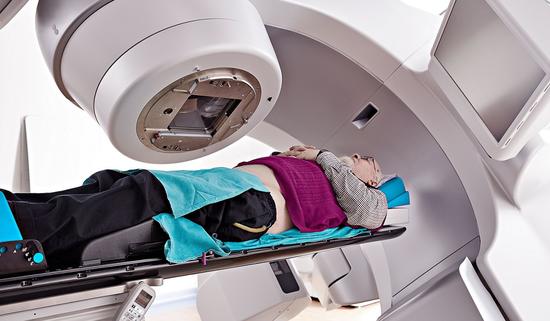Leeds scientists lead the way in next generation radiotherapy research

Leeds scientists and clinicians have been awarded a major cash boost from CRUK to pioneer new radiotherapy technologies and techniques.
These new tools could help more people in Yorkshire survive cancer in the future.
Led by Professor David Sebag-Montefiore, experts from the University of Leeds and the Leeds Teaching Hospitals NHS Trust are set to receive £3.5 million to fund advances in radiotherapy research, including the use of artificial intelligence with imaging technology.
Leeds has been chosen to be one of seven Centres of Excellence in a UK-wide network, RadNet, that will accelerate advances in radiotherapy research. Other centres are located in Manchester, Cambridge, Oxford, Glasgow and London.
In total, CRUK is investing £56 million in RadNet – the charity’s largest ever investment in radiotherapy research.
Radiotherapy is a precise treatment that is given to patients as an out-patient on a daily basis. In its simplest form, it uses high energy X-ray radiation beams to selectively kill cancer cells by irreversibly damaging their DNA, while minimising the effect on the surrounding normal tissues.
CRUK supported some of the earliest research into the treatment of cancer with radiation and pioneered the first use of radiotherapy in the 1920s.
Today, the Leeds Cancer Centre, based at St James’s University Hospital, is one of the largest radiotherapy centres in the UK.
Directed by Professor David Sebag-Montefiore, the research at the Leeds Centre of Excellence will combine the use of artificial intelligence, magnetic resonance imaging and new drugs with radiotherapy, focussing on patients with anal, rectal, prostate, liver and brain cancers.
Professor Sebag-Montefiore said: “We are very proud that Leeds has been awarded this grant to bring the next generation of radiotherapy treatments to patients sooner, helping to save the lives of more people with cancer in Yorkshire.”
“Using artificial intelligence analysis of the MRI scans will help us to tailor future treatment for patients and reduce side effects, resulting in new, precise and personalised treatments - and a better quality of life afterwards - in the next five to ten years.
“Working with other colleagues in imaging, computing and AI disciplines, and combining research excellence across different areas of science, will allow us to deliver this in the quickest timeframe.
“This funding from CRUK will help us accelerate our development of new and advanced radiotherapy techniques, leading to the best treatment approaches for patients across a broad range of cancers, challenging the boundaries of this mainstay treatment through world-first exploratory projects and taking our research in Leeds to an internationally-leading level.”
The Leeds research team includes collaborators from multiple disciplines, including the University’s School of Medicine, Leeds Institute of Medical Research, Leeds Institute of Clinical Trials Research and the School of Computing. They’ll work with Leeds Teaching Hospitals NHS Trust clinicians and researchers to advance imaging and data analytics for radiotherapy.
